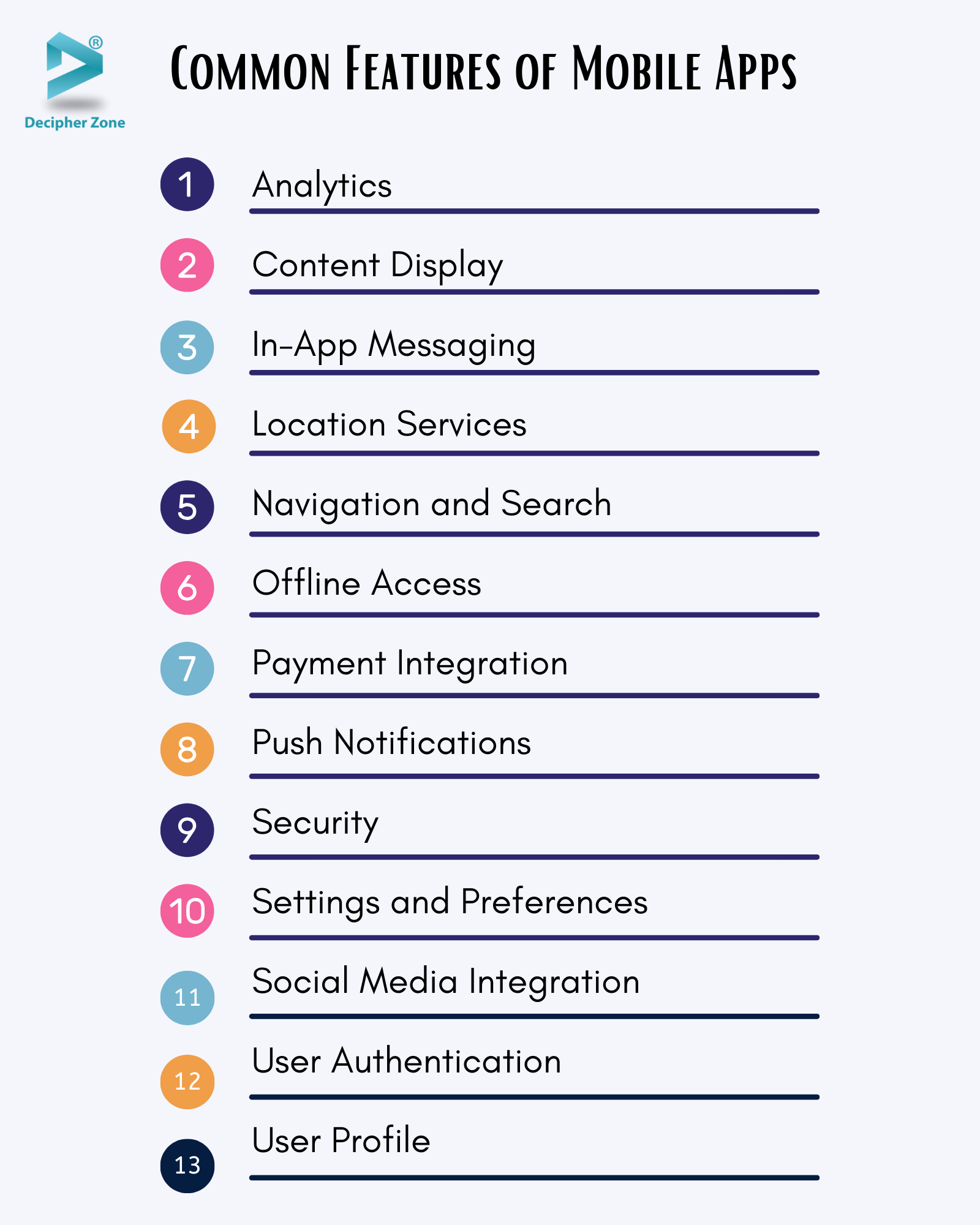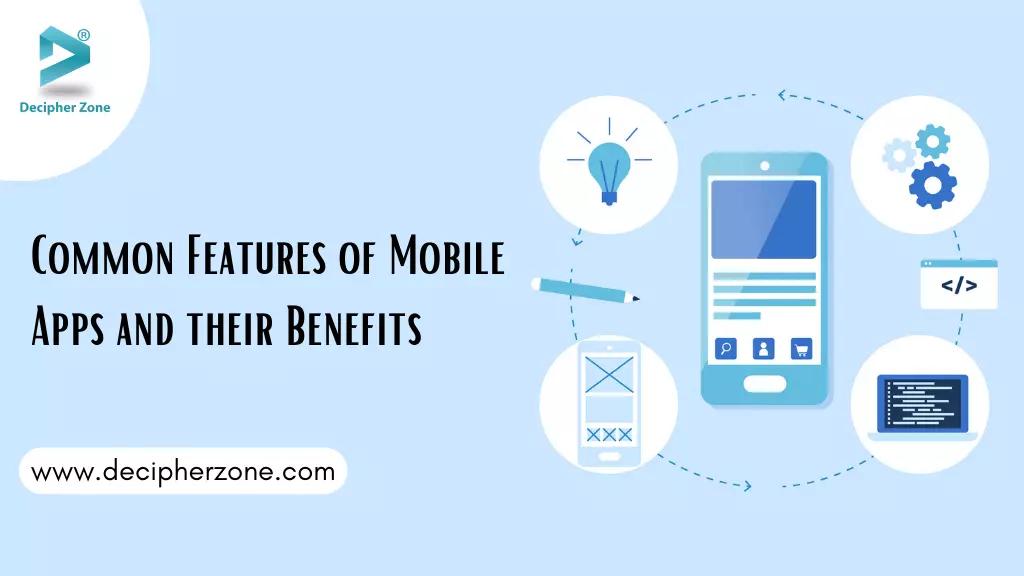What are the Common Features of Mobile Apps and their Benefits? Mobile apps have been an integral part of the daily lives of people, making their day-to-day tasks easier alongside providing businesses an opportunity to extend their services by making them accessible to their customers with ease. But what makes a mobile app stand out in the market? Apart from the design, user experience, and effortless marketing, one thing that several businesses fail to recognize is the features that they integrate into their mobile apps.
Read: Mobile App Development Cost - A Comprehensive Guide
Features play an important role and help make an app create its own identity in the market. For example, Bumble is a dating app that enables women to initiate a conversation first, despite getting a match, to prevent them from unwanted messages from men.
This blog will help you out with some of the common features of mobile apps that you can consider integrating and reach potential customers alongside an increased customer base.
Read: 5 Best Practices For Successful App Development
Common Features of Mobile Apps
Some of the common features of mobile apps that you can consider integrating into your mobile app are as follows -
-
Analytics
-
Content Display
-
In-App Messaging
-
Location Services
-
Navigation and Search
-
Offline Access
-
Payment Integration
-
Push Notifications
-
Security
-
Settings and Preferences
-
User Authentication
-
User Profile
Read: React Native App Development
1. Analytics
This is one of the most common features of mobile apps that helps in providing insightful data to help you make better and more informed business decisions. This feature helps in generating strategic marketing campaigns, and devising other business plans, thus leading to a more successful app.
Read: Native vs Cross Platform App Development
2. Content Display
This feature can be mostly seen on social media platforms, where it provides a personalized set of preferences in a feed or timeline, which the users can scroll through, react to, share, and get to know about the latest trends, updates, and other relevant information.
Read: Mobile App Development Process
3. In-App Messaging
It helps in real-time messaging between the users and the service provider panel or with the customer support team which helps in seamless communication whenever needed alongside enabling better user experiences and resolving issues more efficiently.
Read: How can Android App Development Benefit Your Business?
4. Location Services
It helps in providing location-based services to our customers with ease and is a must-have feature of the on-demand apps. It helps in real-time location tracking of the services or the service providers alongside enhancing the user experience on the app.
Read: Why Develop A Delivery Services App for Your Business?
5. Navigation and Search
It helps provide a better user experience by integrating findable elements that help the users to search their queries and find them efficiently and easily alongside saving time and enhancing the browsing experience within the app.
For example, integrating a search bar at the top of the app helps the users to search for their queries easily.
Read: How can iOS App Development Benefit Your Business?
6. Offline Access
This feature helps ensure continuity while browsing the mobile application, which implies that the users can access certain features and functionalities of the app even without an internet connection. Furthermore, this feature is highly beneficial for those areas where there is poor or no network connectivity.

7. Payment Integration
This is another common feature of mobile apps that helps in seamless transactions within the app. It helps in making the checkout process convenient, quick, and easy.
Read: The Future of Payment Gateways - Challenges and Trends
8. Push Notifications
This is another common feature that almost every mobile application has and acts as a great marketing tactic for your business, thus helping in improved user engagement. This feature helps keep the users informed about the latest updates, offers, and promotions regarding your app/business which in turn helps in increased user retention along with increased sales.
Read: Guide to Native Mobile App Development
9. Security
It is an important feature to consider integrating into mobile app development. This feature helps ensure the security and privacy of your application and other sensitive customer data and helps as a protection against all possible cyber attacks using different methods and implementations like biometrics, multi-factor authentication, and several other data protection mechanisms.
Read: iOS vs. Android: What to Choose for Your Business?
10. Settings and Preferences
This is another important and one of the most common features of mobile apps that help users to select their preferences according to their requirements thus providing a personalized experience alongside enhanced user satisfaction, and reduced app abandonment.
Read: Cross-Platform App Development
11. Social Media Integration
This feature helps in increasing the brand visibility amongst potential customers and also helps in increasing the in-app engagement rate. It helps the users to easily log in to the app through their social media accounts and share the app content on their personal social media handles which in turn helps in increasing the user base.
Read: Top 5 Frameworks for Cross-Platform App Development
12. User Authentication
It is one of the common features of mobile apps that help in enhanced security and personalization of the app for its users. It ensures that the app can be accessed only by authorized users, also enabling them to save their preferences and history as per their needs.
13. User Profile
This feature is another common feature of mobile apps that helps users create, edit, and manage their profiles according to their preferences and other requirements.
Read: Progressive Web App Development - Pros, Cons, and Cost
Wrapping It Up
While wrapping it up, mobile apps have been an integral part of our daily lives and with their continuous adaptation in every sector, they not only offer a wide range of features and functionalities but also help in making a business more accessible for the users anytime and anywhere.
Read: Fantasy Sports App Development
So, if you are thinking about developing a mobile app, then connect with us, or hire a developer, and develop top-notch, feature-loaded, and fully functional mobile apps at market-friendly rates.
FAQs: Common Features of Mobile Apps
What are the different types of mobile apps?
The different types of mobile apps are native apps, hybrid or cross-platform applications, and web apps.
What are the steps involved in mobile app development?
The steps involved in mobile app development are as follows -
-
Market Research on Your Business Idea
-
Set clear Goals and Objectives
-
Devise a Plan
-
UI/UX Design
-
App Development
-
Testing and Quality Assurance
-
Launch the App
-
Post-launch maintenance and Support
How much does it cost to develop a mobile application?
The cost of developing a mobile application for your business can range from $10,000 to $3,50,000 and sometimes, even more, depending on several aspects of your business like the tech stack, the design, the total number of features, the location, and hourly charges of the development team, and so on.

